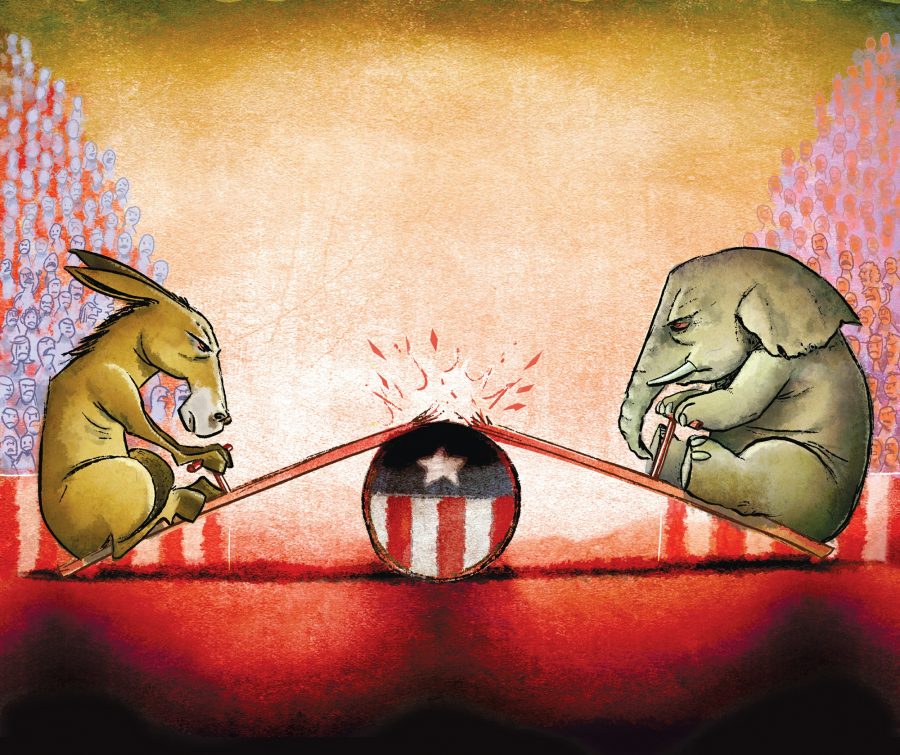Opinion: Identity politics destroy democracy
Matthew Bertucci Louisiana State University Mathematics sophomore
February 8, 2017
The most profound result of the 2016 presidential and congressional elections is, without question, the utter failure of identity politics. The focus on shared identity as a political tactic has proven to be unsuccessful and more recently, quite devastating for certain groups.

Consider the current political atmosphere. Democrats have attempted to form coalitions around popular issues such as LGBT and women’s rights, climate change and fair wage practices.
Each of these issues is particularly divisive, a word that seems to appear all too often in contemporary political discourse. They are divisive not only to the obvious Democratic-Republican dichotomy but to general citizens who would support the party were it not for their view on some number of issues.
In fact, I claim that identity itself is to fault not only for the Democratic losses suffered in the presidential and congressional elections but also for the decline of American politics in general.
It is undeniable that all of us fit into broad categories related to our age, race, gender, sexuality and class distinction, among many others. It is also undeniable that throughout history, the oppression of certain factions of society has called for political resistance in the form of battles for child labor laws, women’s suffrage and civil rights.
That history is undoubtedly still unfolding, requiring guidance by the President, Congress, and most importantly, the democratic majority. Ignoring for the moment the United States’ flawed electoral system, consider this majority that elects those who represent us throughout the government. It is my experience that the average voter is unlikely to question party ideology once an alliance has been formed.
Further, the ideological commitments required to be accepted as a member of the party divorces those that wish to discuss the issues at hand from potential political activism. I speak here specifically of the Democratic party; however, this applies more generally to any traditional party system, including Republicans before Trump.
Allow me to clarify. I believe that it is the duty of the American citizen to be aware of and to think deeply about those political positions which he or she supports. As an LSU student and frequent visitor to both the Loyola and Tulane campuses, I have witnessed the exact opposite.
Students are eager to ask about your political views, however rarely can one find someone with which to discuss the ethics of abortion, the current state of American troops in the Middle East, or Trump’s pact to repeal Dodd-Frank without having them resort to ideology. I do not mean to say that every citizen should analyze climate statistics or read the entirety of Rawls’ A Theory of Justice. The problem lies in that most people just aren’t willing to discuss the merits and justifications of various political viewpoints.
The effects of this avoidance of justification and the will for simple ideology have had enormous effects on the political environment. Is it possible to be both pro-life and a feminist? Who do I vote for if I believe in a limited government, but also that public universities are underfunded? Obviously, these ideas are not mutually exclusive, nor would any reasonable person argue them to be.
However, the systematic repression of discussion among party members has barred certain viewpoints from coalescing to compromise on candidates that best represent party constituents. Instead, many feel out of place due to their opposing viewpoints and politicians’ insistence on identity as the sole unifier. This, of course, as has been discussed ad infinitum, has led many into the chaos that lacks both justification and ideology, i.e. Donald Trump.
To approximate Marx, a specter is haunting the United States – the specter of justification. All the political powers of old America have entered into an ideological alliance to exorcise this specter. It is our duty as citizens to break from ideology for the sake of the future of the country and democracy as an institution.








Anna • Feb 16, 2019 at 9:43 pm
Oh lord, Ratty B. Bad take, bay-bee.
Monique Kozlowski • May 27, 2017 at 8:01 am
Bravo! In light of Loyola of Chicago’s Ramlber’s Awareness of Whiteness Space – it is refreshing to see a Jesuit school where humanism still exists and can see beyond melanin, chromosomes and money. The dignity of every human being is to be upheld. The gifts of every child are to be cultivated and nurtured. Respectful dialogue is essential to democracy. The human experience is complex. Every life has unique circumstances and every will deals with them individually.
Matthew, continue to have the courage to seek and speak the truth. Question, listen and think. And never, never be afraid to be persecuted, marginalized or demonized for speaking the truth in light of the Christ’s teaching. AMDG!